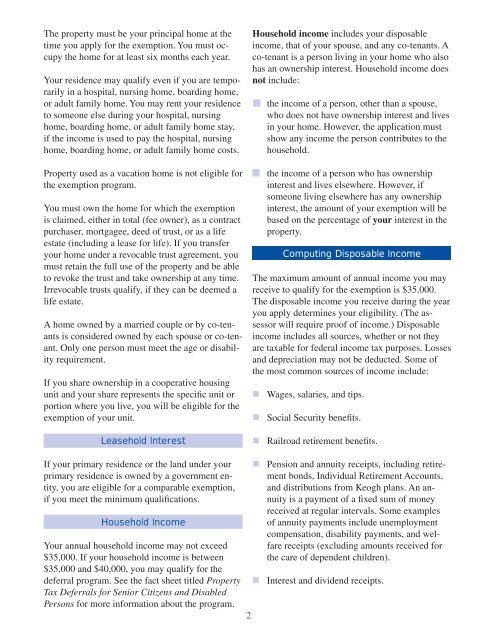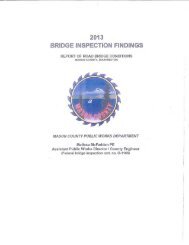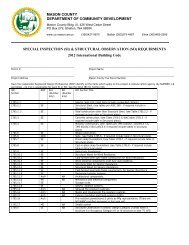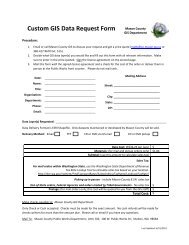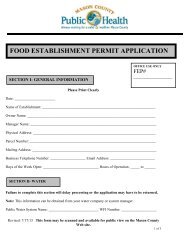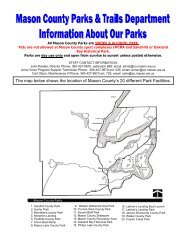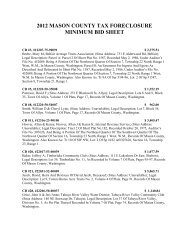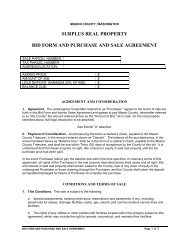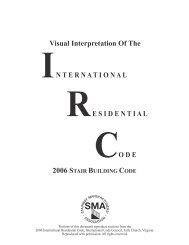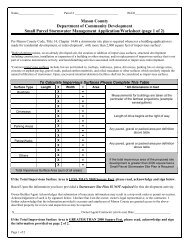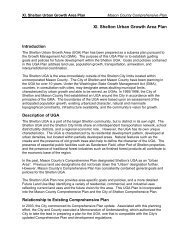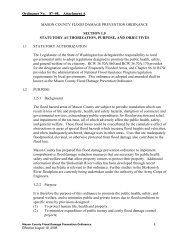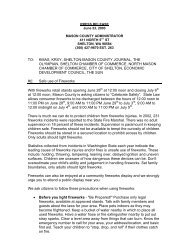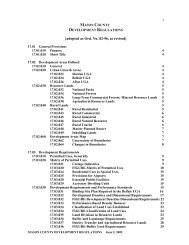Property Tax Exemptions for Senior Citizens and ... - Mason County
Property Tax Exemptions for Senior Citizens and ... - Mason County
Property Tax Exemptions for Senior Citizens and ... - Mason County
You also want an ePaper? Increase the reach of your titles
YUMPU automatically turns print PDFs into web optimized ePapers that Google loves.
The property must be your principal home at the<br />
time you apply <strong>for</strong> the exemption. You must occupy<br />
the home <strong>for</strong> at least six months each year.<br />
Your residence may qualify even if you are temporarily<br />
in a hospital, nursing home, boarding home,<br />
or adult family home. You may rent your residence<br />
to someone else during your hospital, nursing<br />
home, boarding home, or adult family home stay,<br />
if the income is used to pay the hospital, nursing<br />
home, boarding home, or adult family home costs.<br />
<strong>Property</strong> used as a vacation home is not eligible <strong>for</strong><br />
the exemption program.<br />
You must own the home <strong>for</strong> which the exemption<br />
is claimed, either in total (fee owner), as a contract<br />
purchaser, mortgagee, deed of trust, or as a life<br />
estate (including a lease <strong>for</strong> life). If you transfer<br />
your home under a revocable trust agreement, you<br />
must retain the full use of the property <strong>and</strong> be able<br />
to revoke the trust <strong>and</strong> take ownership at any time.<br />
Irrevocable trusts qualify, if they can be deemed a<br />
life estate.<br />
A home owned by a married couple or by co-tenants<br />
is considered owned by each spouse or co-tenant.<br />
Only one person must meet the age or disability<br />
requirement.<br />
If you share ownership in a cooperative housing<br />
unit <strong>and</strong> your share represents the specific unit or<br />
portion where you live, you will be eligible <strong>for</strong> the<br />
exemption of your unit.<br />
Leasehold Interest<br />
Household income includes your disposable<br />
income, that of your spouse, <strong>and</strong> any co-tenants. A<br />
co-tenant is a person living in your home who also<br />
has an ownership interest. Household income does<br />
not include:<br />
• the income of a person, other than a spouse,<br />
who does not have ownership interest <strong>and</strong> lives<br />
in your home. However, the application must<br />
show any income the person contributes to the<br />
household.<br />
• the income of a person who has ownership<br />
interest <strong>and</strong> lives elsewhere. However, if<br />
someone living elsewhere has any ownership<br />
interest, the amount of your exemption will be<br />
based on the percentage of your interest in the<br />
property.<br />
Computing Disposable Income<br />
The maximum amount of annual income you may<br />
receive to qualify <strong>for</strong> the exemption is $35,000.<br />
The disposable income you receive during the year<br />
you apply determines your eligibility. (The assessor<br />
will require proof of income.) Disposable<br />
income includes all sources, whether or not they<br />
are taxable <strong>for</strong> federal income tax purposes. Losses<br />
<strong>and</strong> depreciation may not be deducted. Some of<br />
the most common sources of income include:<br />
• Wages, salaries, <strong>and</strong> tips.<br />
• Social Security benefits.<br />
• Railroad retirement benefits.<br />
If your primary residence or the l<strong>and</strong> under your<br />
primary residence is owned by a government entity,<br />
you are eligible <strong>for</strong> a comparable exemption,<br />
if you meet the minimum qualifications.<br />
Household Income<br />
Your annual household income may not exceed<br />
$35,000. If your household income is between<br />
$35,000 <strong>and</strong> $40,000, you may qualify <strong>for</strong> the<br />
deferral program. See the fact sheet titled <strong>Property</strong><br />
<strong>Tax</strong> Deferrals <strong>for</strong> <strong>Senior</strong> <strong>Citizens</strong> <strong>and</strong> Disabled<br />
Persons <strong>for</strong> more in<strong>for</strong>mation about the program.<br />
2<br />
• Pension <strong>and</strong> annuity receipts, including retirement<br />
bonds, Individual Retirement Accounts,<br />
<strong>and</strong> distributions from Keogh plans. An annuity<br />
is a payment of a fixed sum of money<br />
received at regular intervals. Some examples<br />
of annuity payments include unemployment<br />
compensation, disability payments, <strong>and</strong> welfare<br />
receipts (excluding amounts received <strong>for</strong><br />
the care of dependent children).<br />
• Interest <strong>and</strong> dividend receipts.


